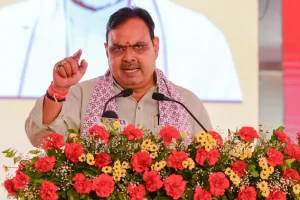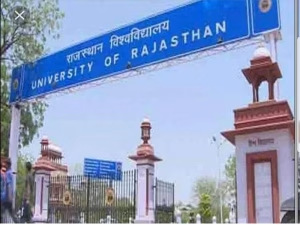The Rajasthan government has taken a firm stance against conducting Rajasthan student union elections during the current academic session, presenting its case before the High Court with significant implications for student democracy across the state. This development has emerged from a Public Interest Litigation (PIL) filed by Jai Rao, a post-graduate student from Rajasthan University, highlighting the ongoing tension between administrative convenience and student representation.
The state government’s submission to the High Court emphasised that the ongoing implementation of the National Education Policy (NEP) has made it impossible to conduct student union elections within the prescribed timeline, with Vice-Chancellors expressing concerns about potential disruption to academic schedules and campus atmosphere. The legal challenge brought forward through the PIL has forced the government to articulate its position on the Rajasthan student union elections within the judicial framework.
The PIL filed by Jai Rao represents broader student concerns about democratic participation in university governance. This legal intervention has brought the issue of Rajasthan student union elections into sharp focus, questioning whether administrative challenges should supersede fundamental democratic rights of students in higher educational institutions.
 The implementation of the National Education Policy serves as the cornerstone of the government’s argument against conducting Rajasthan student union elections this academic year. Officials argue that the comprehensive nature of NEP reforms requires undivided attention from university administrations, making it impractical to simultaneously organise electoral processes across multiple institutions.
The implementation of the National Education Policy serves as the cornerstone of the government’s argument against conducting Rajasthan student union elections this academic year. Officials argue that the comprehensive nature of NEP reforms requires undivided attention from university administrations, making it impractical to simultaneously organise electoral processes across multiple institutions.
Also Read: Shocking Rajasthan man’s espionage detected.
and for more information on the PIL, click on Rajasthan PIL
The government’s reply specifically referenced the Lyngdoh Committee’s recommendation that elections be held within eight weeks of the start of the session—a timeline that has become unfeasible under current circumstances. This timeline constraint has become a critical factor in the decision to postpone Rajasthan student union elections indefinitely.
The NEP implementation encompasses curriculum restructuring, assessment methodologies, and administrative reforms that demand significant resource allocation. University officials contend that diverting attention to electoral processes would compromise the quality of policy implementation, thereby affecting long-term educational outcomes more severely than temporarily suspending Rajasthan student union elections.
The state government included views from Vice-Chancellors of nine universities, with most advising against elections due to academic schedules and session delays. These academic leaders have expressed unified concern that Rajasthan student union elections could exacerbate existing disruptions caused by the ongoing educational transition.
University administrators argue that electoral campaigns and associated activities would further strain already stretched resources. The consensus among Vice-Chancellors reflects broader administrative challenges faced by higher education institutions during this transitional period, making Rajasthan student union elections appear counterproductive to institutional stability.
The administrative perspective emphasises maintaining academic continuity over political processes, suggesting that Rajasthan student union elections could potentially derail carefully planned implementation schedules for crucial educational reforms.
The postponement of the Rajasthan student union elections raises fundamental questions about democratic participation in university governance. Student unions traditionally serve as vital platforms for student voice, advocacy, and representation in academic decision-making processes. The absence of elected student representatives creates a significant gap in institutional democracy.
Critics argue that suspending Rajasthan student union elections effectively disenfranchises thousands of students who rely on these democratic institutions for addressing academic and welfare concerns. The timing of this suspension, coinciding with major policy implementations, has raised questions about whether students are being excluded from discussions that directly impact their educational experience.
The democratic deficit created by postponing Rajasthan student union elections may have long-term implications for student engagement and institutional governance, potentially establishing concerning precedents for future administrative decisions.
The High Court’s handling of this PIL concerning Rajasthan student union elections will likely establish important legal precedents regarding the balance between administrative convenience and democratic rights in educational institutions. The judicial decision could influence similar cases across other states facing comparable challenges.
 The legal framework governing student elections emphasises timely conduct within specific parameters, making the government’s position regarding Rajasthan student union elections potentially vulnerable to judicial scrutiny. Courts have historically protected democratic processes, even in institutional settings.
The legal framework governing student elections emphasises timely conduct within specific parameters, making the government’s position regarding Rajasthan student union elections potentially vulnerable to judicial scrutiny. Courts have historically protected democratic processes, even in institutional settings.
The suspension of Rajasthan student union elections significantly affects campus political culture and student activism. University campuses serve as training grounds for democratic participation, and the absence of electoral processes diminishes opportunities for political education and leadership development among students.
Student organisations and political parties traditionally use these platforms for mobilising support and articulating policy positions. The postponement of Rajasthan student union elections disrupts these established patterns of political engagement and may have broader implications for youth political participation.
The resolution of the PIL regarding Rajasthan student union elections will determine whether alternative mechanisms can be established to ensure student representation during the transition period. The High Court’s decision may mandate specific timelines for conducting delayed elections or require interim arrangements for student governance.
Educational policymakers must balance the legitimate need for smooth NEP implementation with equally important requirements for democratic participation. The outcome of this legal challenge will significantly influence how other states approach similar dilemmas regarding student elections during policy transition periods.
The case highlights the broader challenge of maintaining democratic institutions while implementing major educational reforms, suggesting that future policy implementations must better account for preserving student democratic rights alongside administrative efficiency.

